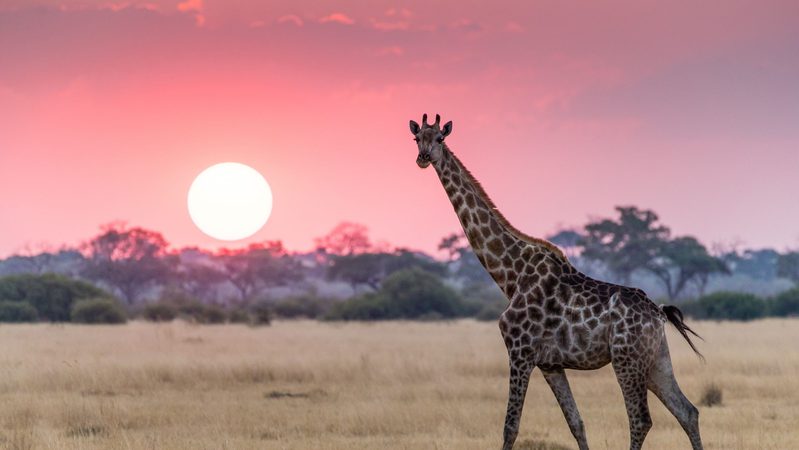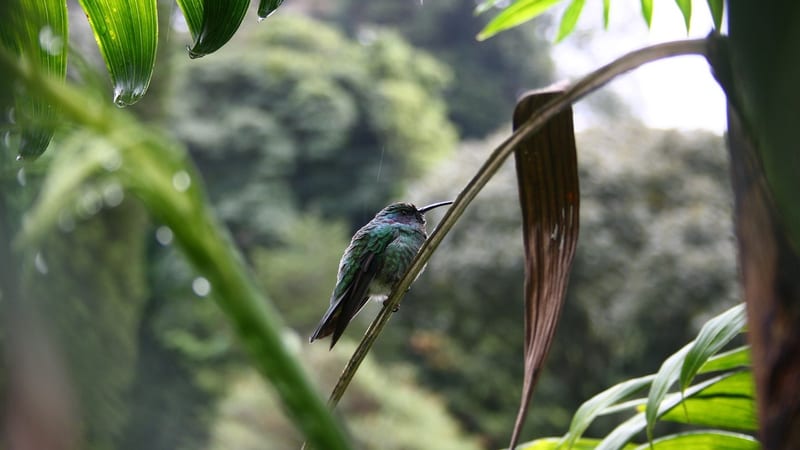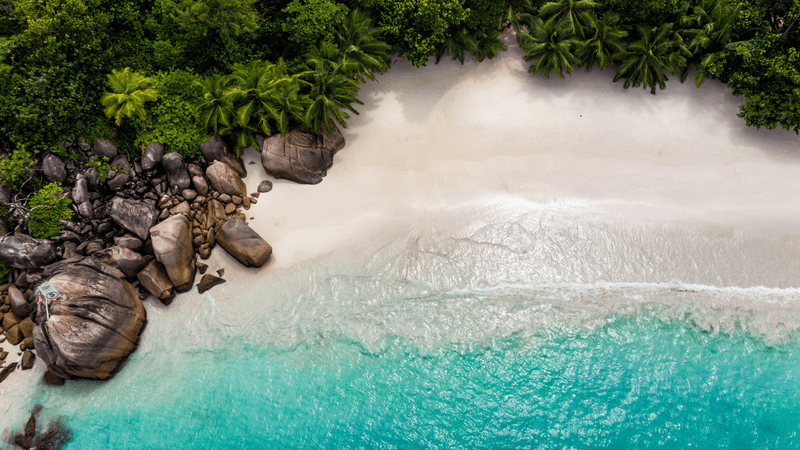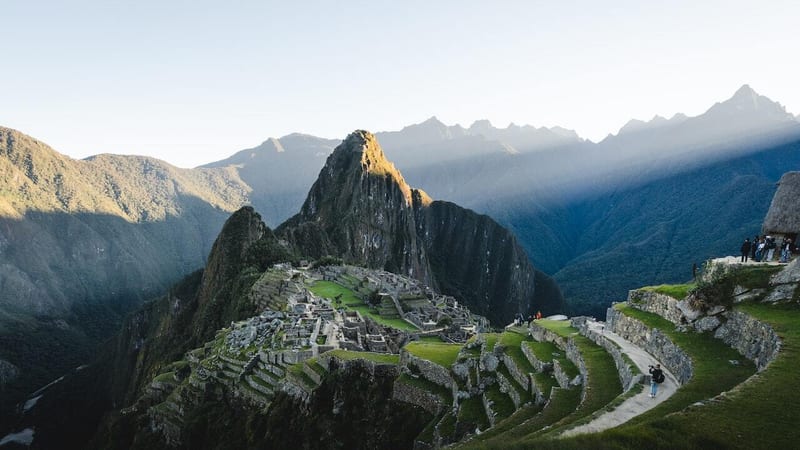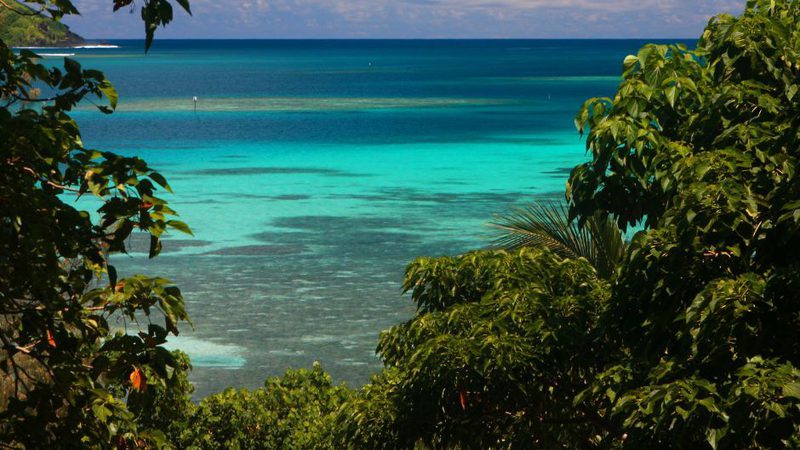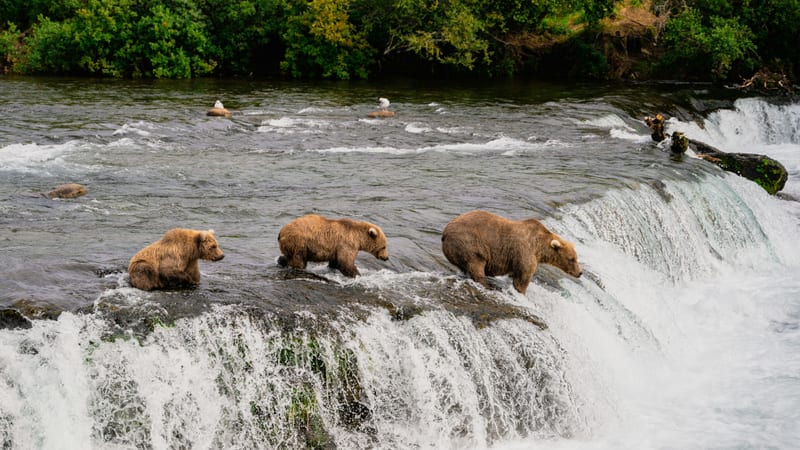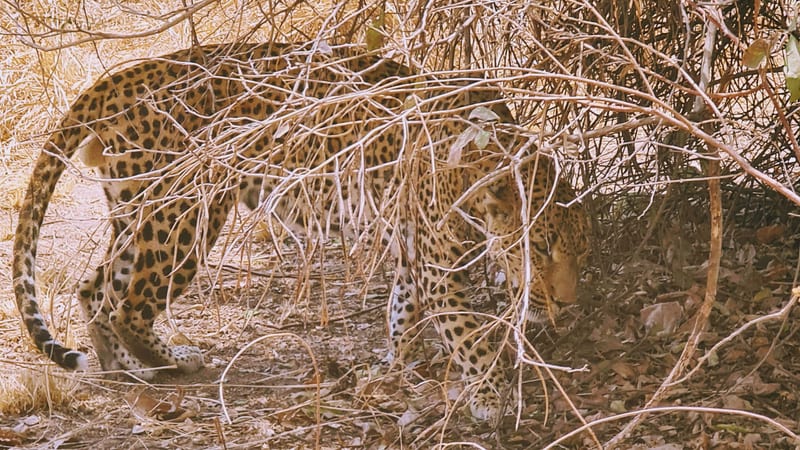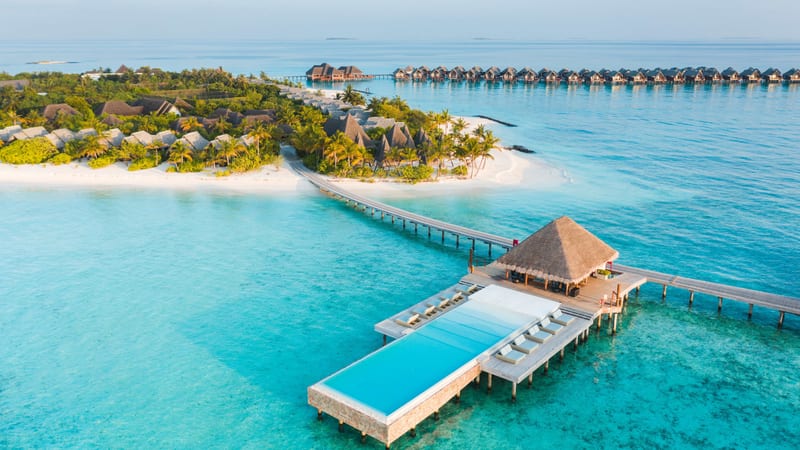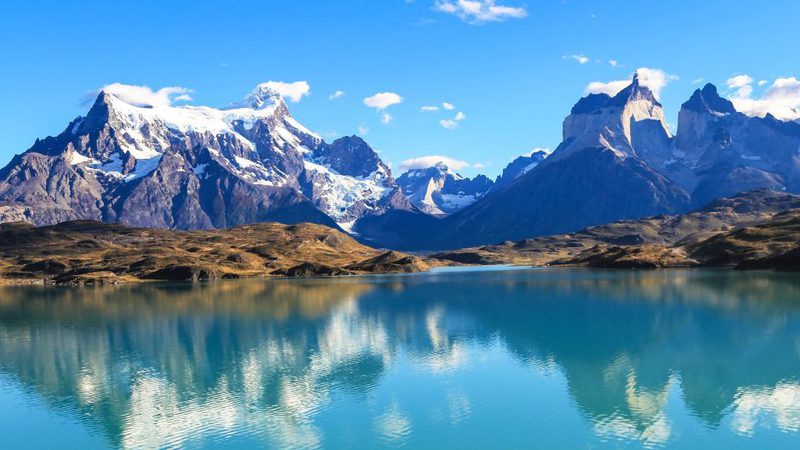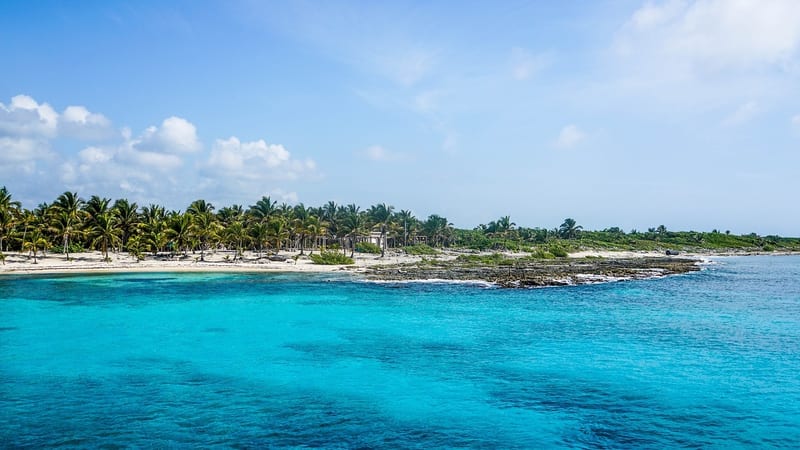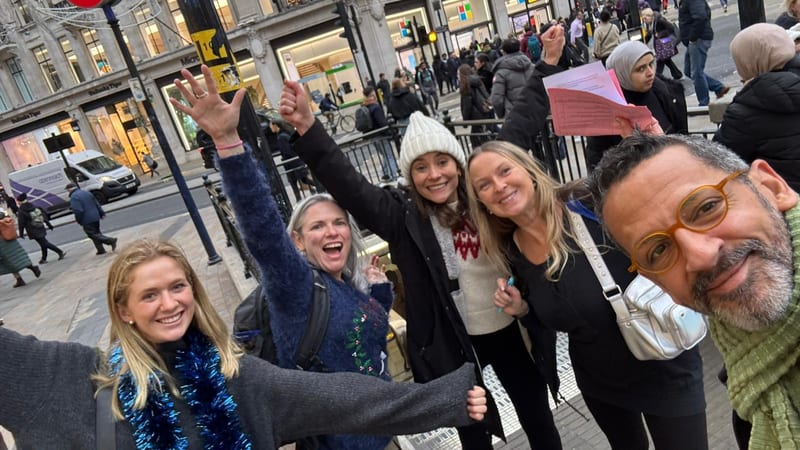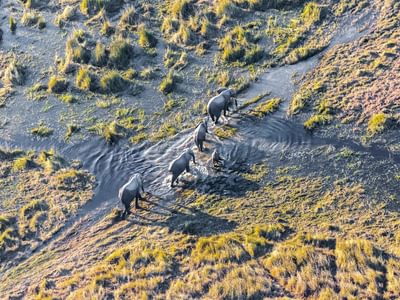
The watery wilderness of Botswana’s Okavango Delta is arguably one of the best places in the world to see wildlife. Consisting of a huge area of grass plains it is flooded seasonally by the Okavango River at the height of the dry season and becomes a lush wetland of little islands connected by crystal-clear sandy channels. The annual flood starts to arrive in late May and lasts until around October, peaking from July to September (for more details, see our blog Understanding the Okavango Delta Flood in Botswana).
So much of it is hard to access that human incursion has been limited and the landscape looks and feels like it’s barely touched by a human hand. Safari camps are small and dotted across a vast area of 125,000 square miles, and most are concentrated in or around the Moremi Game Reserve in the heart of the Delta, although even here it feels ‘empty’ compared to some other game reserves in Southern Africa.
The ‘road network’ in the game reserve and surrounding concessions is limited to rough sandy tracks, many of which are underwater for part of the year, and this means that when you’re on safari here there is much more to do than just the traditional game drive. The Delta’s unique geography lends itself to a blend of land and water-based activities, more than any other safari destination… here are some of our top activities to try.
1. Game Drive
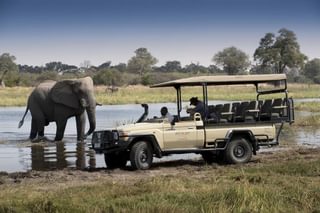
Everyone’s idea of a safari includes some time in the back of a 4 x 4 on the lookout for wildlife. The elevated position you have in a game viewer means you can see further and you have a vastly improved chance of getting close to wildlife as a vehicle is not viewed as a threat and most animals simply ignore it or use it as shade!
Why do a game drive?
Taking a game drive to explore the drier areas of the Okavango is always rewarding as there is a rich diversity of plains game seeking grazing, the delta is home to buffalo, giraffe & zebra, as well as locally water-specialised antelope species such as Red Lechwe with its distinctive heart-shaped nose, and the rare Sitatunga which has long splayed hooves enabling it to run through the water to evade predators.
If you’re lucky on a game drive you stand a good chance of seeing lions or even leopards sleeping off the previous night’s successful hunting. If you’re out early or late you might even catch the predators while they’re still active before they retreat to shade in the heat of the day. I recently had a brilliant game drive while staying at Natural Selection’s Sable Alley in the Khwai Private Reserve where we spent a lot of time with two big male lions engaged in a protracted territorial battle. We followed them in the vehicle as they sized each other up, roared their dominance, and chased each other back and forth across a bridge. As much as I love walking safaris we couldn’t have done this on foot!
Another quintessential part of a game drive is evening sundowners. It’s a safari tradition to pause during your afternoon game drive, find somewhere with a lovely view and enjoy a cold drink and some snacks while watching the sunset.
Afterwards, you drive back to camp as the skies darken, and the predators become active, start calling and beginning their nocturnal hunting activity. You can take night drives at most camps but it’s worth checking this with us.
Game drives usually take place twice a day, early in the morning and in the late afternoon, and last for about 2 – 3 hours. Depending on your camp there are usually between 6 to 9 passengers in a vehicle so you will all get a good view and elbow room. While large areas of the delta remain dry enough to enable game drives in 4 x 4 vehicles you’ll usually find some water crossings are necessary in all but the driest of seasons (take a look at when to visit Botswana).
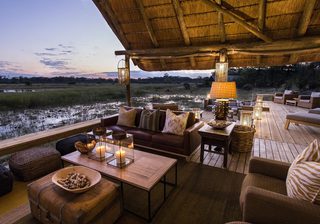
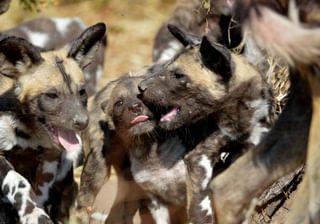
2. Guided Bush Walk
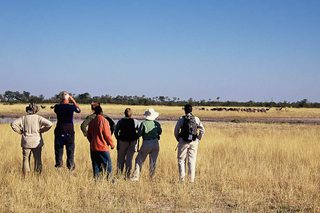
I love a walk in the bush and would never pass up an opportunity to get out on foot, and some camps in the Delta only offer human-powered activities so walking is definitely on the agenda here!
Why do a bush walk?
Without the noise and exhaust of a vehicle engine, you can really tune into the sounds and scents of the bush around you and begin to feel part of the landscape, not just a passive observer. On foot, you have a different perspective to a driven or water-based safari. You spend time with your guide learning about the area, the history and the uses for the plants you come across. You will often see game at a distance, and part of the fun is to see how close you can get to the giraffe, zebra or other plains game. Predators give humans a wide berth, but if you’re lucky you might be able to see them from afar and your guide will ensure that you maintain a mutually respectful distance.
Usually walking safaris take place in the morning before the heat of the day makes it uncomfortable. Depending on your camp (and what’s been going on in the night) you’ll set off on foot straight from camp, or you might take a short boat/mokoro/drive to a good spot and head into the wilderness. Walking in Botswana differs from other countries in that often you don’t need an armed scout to accompany you.
Walking safaris usually only take 2 - 3 hours and are at a relaxed pace over mostly flat ground so are suitable for nearly all visitors, although 12 years of age is the minimum for children in many lodges. It’s best to travel light while you’re walking but decent boots or trainers, your camera, water and a sunhat are essentials.
Where to stay: Some camps, such as Delta Camp in the heart of Moremi Game Reserve, only offer non-motorised activities which is great for your carbon footprint, so you’ll spend quite a bit of your stay exploring on foot. Delta Camp is also one of our Top Five Eco Lodges in Botswana.
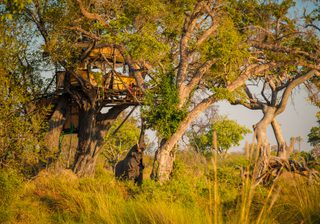
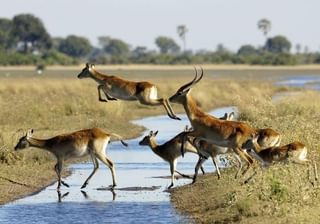
3. Mokoro or Canoe Safaris
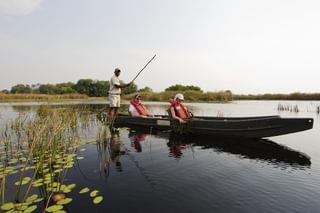
Possibly the most iconic of all Okavango activities, if you don’t do anything else on your Botswana safari you really shouldn’t miss out on a Mokoro trip. The Delta is all about water and climbing into a Mokoro and setting out amongst the reeds is an essential part of any safari here.
The maze of channels in the flooded Okavango Delta is created by hippos as they move from the water onto dry land in their nightly search for fresh grazing. Other animals such as elephants use them as a means of moving between higher ground so they are kept open and free of obstructions. During the day they make the perfect pathway for the traditional dugout canoes known collectively as Mekoro, or singularly, Mokoro.
Why do a Mokoro safari?
The perspective you gain from being inches from the water is unachievable by any other means unless you’re brave/crazy enough to get into the water!! At night you will hear the incredible wall of sound created by frogs, but it’s only in a Mokoro that you get eye to eye with the culprits, Angolan Reed Frogs, and wonder how something so tiny can make so much noise?! Also, how can one species come in so many gorgeous colours?
Travelling by Mokoro is almost silent, the only sound is the dripping of water from the long pole your guide uses to propel the boat through the water and the animals sometimes don’t hear you coming. One of the best safari memories I have is of surprising a herd of Red Lechwe hidden in the tall reeds. When we startled them the whole herd splashed across the channel directly in front of us, their heads higher than mine! The sunshine sparkling through the spray created by their hooves is a mental image that will stay for me forever.
Traditionally Mokoro were made from a hardwood tree trunk, but now to preserve the native trees they’re made from fibreglass which is a more sustainable option. From a distance you can’t tell the difference and take it from me, the fibreglass ones are a LOT more comfortable.
During your mokoro safari, you are poled by an expert guide who will have grown up in the area and will have been poling a mokoro since they were a child. The polers have amazing balance and they make it look easy. There are usually two passengers per mokoro, and you each have a seat so you can relax, lean back and enjoy the ride.
You can take a mokoro trip at any time of day, but like most safari activities morning and evening are best, and they usually only last an hour or so. In some camps you are able to Mokoro straight from camp at certain times of the year when the flood is at its highest, at others, it’s a short drive to a Mokoro station.
Where to stay: Xugana Island has permanent water all year round so is an ideal place to stay if your focus is on Mokoro expeditions or motor boat trips.
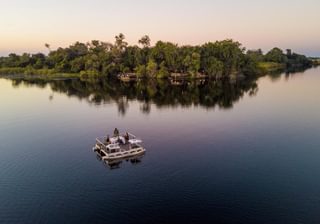
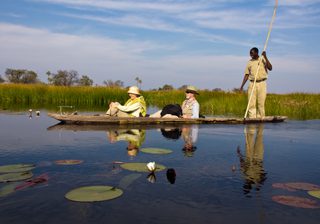
4. Motorboating
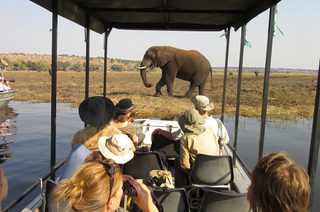
In many camps in the Delta travel by motorboat is the only powered way to get around during the flood as tracks are waterlogged and become impassable by vehicle. This is the time to take to the water!
Why take a motorboat trip?
Travelling by motorboat means that it’s possible to take longer outings, carry more kit (cool boxes, fishing gear) and venture further afield than you can by Mokoro alone.
By motorboat you can explore the wider, permanent channels of the Delta and one of the main reasons to do this is to see hippos from a safe but relatively short distance. During the heat of the day hippos remain mostly submerged in groups or ‘pods’. Once they become aware of your presence they pop their heads up out of the water and keep a wary eye on you. They are great fun to spend time watching, as they continually grunt, snort and blow water from their nostrils and jockey with each other for prime position. Each pod has a dominant bull, and they will be the most observant, making sure that you don’t get too close. Being in a stable flat bottomed boat means that you can move about to get the best angle for a photo.
The motorboats used by most camps are aluminium flat-bottomed dory-type boats with powerful outboard engines. They can comfortably seat six passengers, plus your guide who will usually drive as well.
A boat trip can be taken any time of day, and like other activities mornings and afternoons are best although many have a sunshade so you can go out in the midday sun if the fancy takes you. A boat trip at sunset is really special, and of course you can always have a sundowner as well. Cheers!
Where to stay: Nxamaseri Lodge
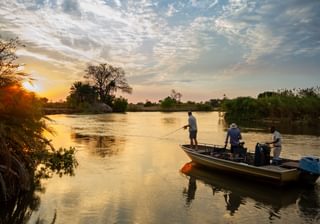
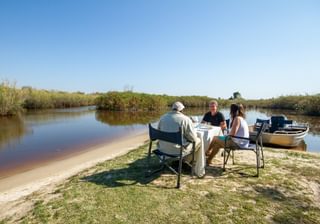
5. Heli Flip
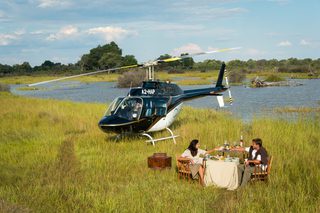
Helicopters are an ideal way to move between camps in different areas of the delta where there’s not enough dry land for a runway, and there are a couple of very good operators who also offer short ‘Heli Flips’ above the delta.
Why try it?
It’s a bit of a Bucketlist treat, but the thrill of a heli flip, flying low over the glimmering waters with the doors off is every adrenaline seeker’s dream!
Heli Flips are usually between 30 minutes to an hour, or you could take a helicopter trip used to venture further afield for a special day trip, for example to the Tsodilo Hills which is a UNESCO World Heritage Site of great cultural significance and has one of the highest concentrations of rock art in the world.
Where to stay: African Bush Camps which include Khwai Leadwood and Khwai Bush Camps in the Okavango Delta offer a complimentary heli flip to guests staying 3 nights or more at most of their camps.
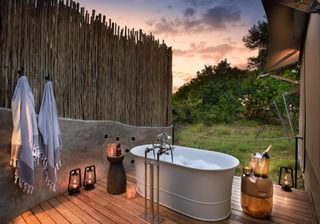
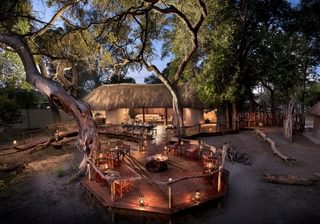
6. Sleep Out
Some camps offer guests the option of staying in a ‘Sleep Out’. These are little satellite bedrooms, often just a raised platform or sometimes a treehouse, which are close to the main camp but far enough away to feel remote and where lucky guests (usually staying for a minimum of 3 nights) can enjoy one of their nights really out in the wild.
Why try it?
The opportunity to feel alone in the wilderness with no other distractions, lights or noise from camp is one of the most special things you can do while on a safari; super romantic if you’re a couple & a must for those on a Botswana honeymoon or a great adventure to share if you’re travelling as a family.
The Sleep Out deck is usually a platform elevated about 15 – 20 feet above the ground, with a shower & loo underneath. They have comfortable beds, luxurious bedding, (no sleeping bags here!), hot water bottles in the colder months and mosquito nets. You will be dropped off by your guide, either after dinner, or earlier with a delicious packed picnic complete with drinks and hot water for coffee in the morning.
Once your guide has left you (with instruction on how to work the radio which is there if you need it), it’s just you and the African night. If you’re lucky you’ll get a clear sky and you can lie in bed looking at the Milky Way, counting shooting stars and listening out for the distant roar of lions or the whoop of hyenas. Heaven!
In the morning your guide will come to collect you and return you to the relative hustle & bustle of camp.
Where to stay: Camp Okavango or Xigera
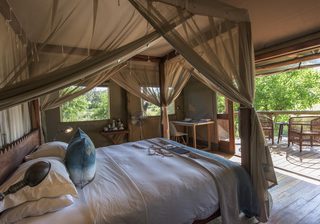
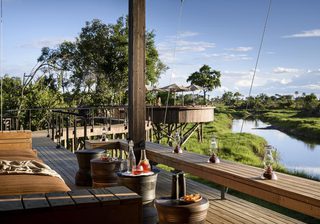
7. Multi-Day Fly Camping
Some camps will offer intrepid guests the opportunity to take a multi-day expedition into the delta by Mokoro, camping out on small islands in the heart of the Delta.
Why try it?
For the adventure seeker, this is a fantastic way to really explore the Delta and take the time to relax into the rhythm of the bush, your days are governed by the rising and setting of the sun. Moving deeper into the delta than most visitors, you can feel like you’ve stepped off the world for a few days. The ultimate digital detox!
By day you travel by a combination of Mokoro and on foot, resting during the heat of the day and at night staying on islands in simple dome tents. Facilities are basic but comfortable with bucket showers and loos. Cooking is done over the fire and meals are simple but delicious, and there’s an ice box to keep the sundowners cool. This can be done as part of a small group or arranged for a couple, a group of friends or a family. If you can’t live without hair straighteners then this is not the trip for you, but if you’re prepared to live without mains electricity for a couple of days then you’ll find this a hugely rewarding experience.
Fly camping expeditions usually are for three or four days but can be tailored to suit any itinerary.
Where to stay: Oddballs Camp
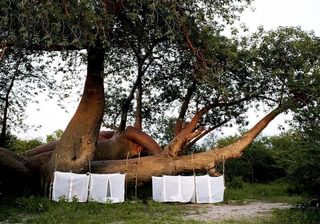
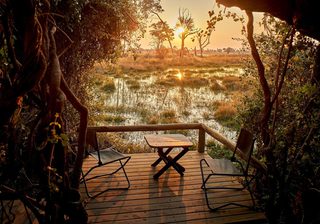
8. Fishing
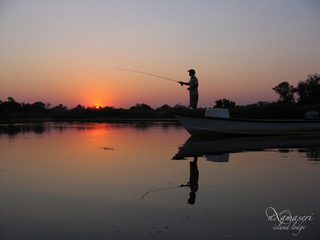
The deeper channels of the Okavango are teeming with fish and many camps offer you the opportunity to go out in a flat-bottomed dory for a spot of catch-and-release fishing.
Why try it?
Fishing in the Okavango is not just for the seasoned angler, before I tried it in May this year I had never fished before and I was surprised at how much fun it was. Although I didn’t catch anything my husband, Sean, caught two good-sized bream, while I mostly enjoyed learning to cast, and just being on the water (with a beer in hand obviously!)
There are bream, bass, tilapia and catfish and if you’re up for a challenge you can go after the infamous, and very toothy, tigerfish. Renowned as the feistiest of freshwater fish catching a tiger is an experienced angler’s dream.
Your guide will know the best spots for every type of fish, and they are usually patient coaches if my own experience is anything to go by!
You can fish from most camps in the Delta but the Panhandle area is the best place to try and catch Tiger Fish. The best months for fish are Sept-Oct
Where to stay: Nxamaseri
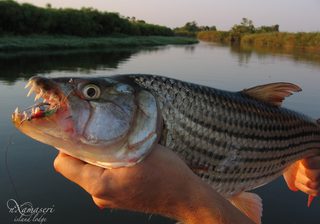
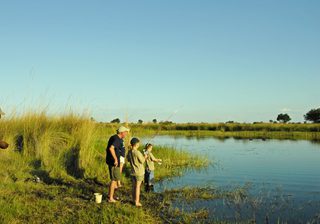
If you are planning a holiday to Botswana, give our team a call on 01768 603 715 or enquire now. Whether you are planning your first or fifth safari, a honeymoon or a Botswana family holiday, we can help!

